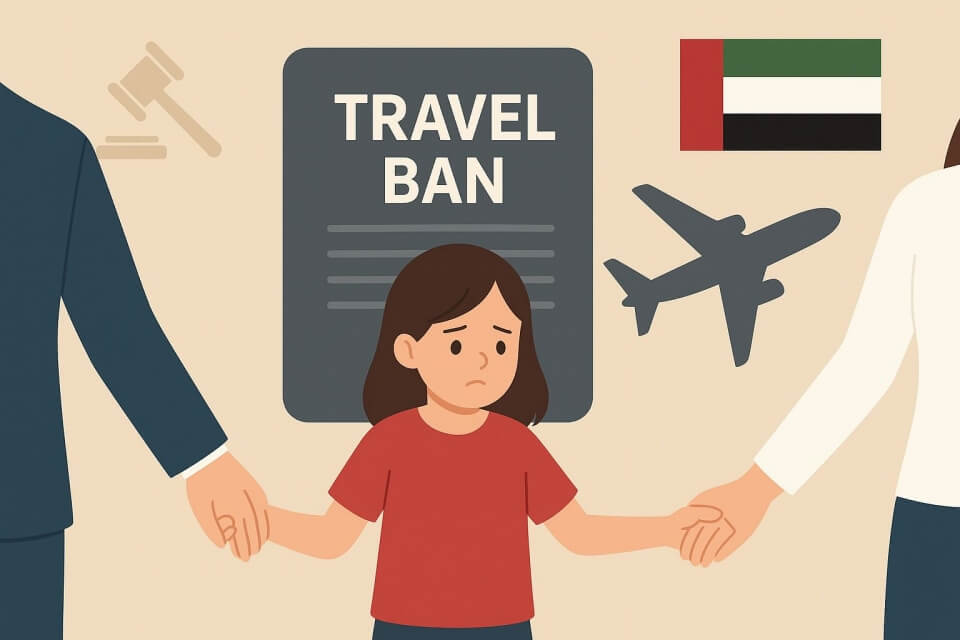Legal blog
UAE Travel Ban: What You Need to Know in 2025

The ban
From a legal perspective, the ban is a legal restriction of practicing a right or a prohibition from taking a certain action; it is a mechanism used by the legislator to organize the conduct of people in certain circumstances for the protection of public or private interests.
The travel ban
The UAE travel (immigration) ban is a prohibition from entering or re-entering the territory of the UAE, or a prohibition from leaving the country until certain conditions are satisfied, i.e. the reason(s) for the ban cease to exist. The travel ban supposes an order issued by the UAE authorities to all the state's border crossings prohibiting the concerned person from entering or leaving the country.
The difference between a travel ban and a labor ban
The UAE labor ban is another ban type which is sometimes confused with a travel ban. Both types are distinct; the UAE labor ban has no connection with travel restrictions. It is related only to labor relations governed by the Ministry of Human Resources and Emiratisation (MOHRE, formerly – Ministry of Labor) in accordance with the UAE Labor Law and relevant decrees issued by the Ministry.
So, the labor ban does not exist under other employment relationships where the approval of MOHRE is not required. This is the case, for example, when employment is granted through any of UAE free zone companies, as such labor relations are governed by respective Free Zone Authorities or government entities, not by MOHRE.
The person who has a labor ban – whether for six months, a year, or permanent – can still enter the UAE, but is prohibited from getting a work permit from MOHRE until the labor ban period is elapsed. Such a person, for instance, can come to the country as a tourist, student, investor, or family member. The person with a labor ban can also get a job in the UAE and work for a free zone company or government entity (as such employment doesn't require a work permit from MOHRE).
On the contrary, those having a travel (immigration) ban cannot enter the UAE for any ground, whether it be for work, tourism, or any other.
The difference between a travel ban and an arrest warrant
People often get confused about an arrest warrant (detention order) and its relation to a travel ban in the United Arab Emirates.
The UAE arrest warrant is an order issued by the competent authority to detain:
- individuals accused of committing criminal offenses according to the articles (45-46) of the UAE Criminal Procedures Law;
- debtors abstaining from the execution of the final judgment according to articles (324-328) of the UAE Civil Procedures Code.
In case of criminal offenses, the arrest warrant is ordered by a member of the public prosecution against the accused individual present at the incident scene if there is sufficient evidence of his/her involvement in committing the crime. If a member of the public prosecution issued an arrest warrant against the accused who is not present at the crime scene, then the order should be enforced by one of the public authority officers.
In case of civil procedures, the detention order may be issued by the execution judge upon the request of the party to whom the decision has been delivered, provided that the debtor is abstaining from payment, and the debt is not less than AED 10,000 (unless it is a fine, prescribed alimony or a work remuneration).
So, the goal of the arrest warrant is different from that of the travel ban. The purpose of the former is to detain an accused person for the sake of criminal investigations or execution of the civil court judgment; while the purpose of the latter is to prohibit specific persons only from entering or leaving the country for the sake of protecting public or private interests.
Imposing a travel ban does not mean, automatically, that the banned person will be detained and put in jail. If the ground for the travel ban is not committing a crime, then there is no arrest warrant; hence the banned person will be prohibited only from crossing the UAE border without being arrested.
If a person is accused of committing a crime, then he or she is automatically banned from traveling, but may not be arrested unless there is an arrest warrant issued as a part of the criminal investigation procedures.
To sum up, an arrest warrant automatically entails a travel ban but not vice versa.
How to check whether you have a travel ban
In the UAE, there are no official online portals or websites that provide the complete service of checking a travel ban. Nevertheless, recently, Dubai Police launched a free online service allowing you to check if you have a travel ban due to financial cases registered in police stations in the Emirate of Dubai. Although such an initiative is a significant step forward, the service has some strict limitations (see How to check financial police cases in Dubai below).
If you are not sure that possible grounds for imposing a travel ban on you are limited to bounced cheque criminal cases filed in Dubai, the status of the ban has to be checked thoroughly through the Police Department via a personal visit. You can check the travel ban on your name in person at any UAE police station; however, there is a risk of being arrested while visiting a police station if there is an arrest warrant on you.
Therefore, the safest option is to check a travel ban through an attorney. For that, you need to provide your attorney with a copy of your passport and the relevant power of attorney. Also, the check through an attorney in most cases is the only option if you are outside of the UAE at the moment.
How to check financial police cases in Dubai
The new online service launched recently by Dubai Police allows checking if you have a travel ban due to financial cases in Dubai. The service is free and available through the Dubai Police website or mobile application and has some strict limitations. The results of the check are limited to:
- financial cases only;
- cases filed and registered only in Dubai police stations.
So, for example, if there is a civil or execution case, or police case not related to a financial crime or case registered in another emirate, the service will not show you that you have a case/travel ban. It is also worth mentioning that UAE banks have the right to open a case in the emirate where their head office or the debtor's account branch is located. Thus, a bank from Abu Dhabi or Ras al Khaimah may file a case in their home emirate, and the service of Dubai Police will not show you that.
Moreover, to use the service, you must have:
- Emirates ID number; and
- active UAE mobile phone number associated with this Emirates ID to receive an access code.
How to use the service:
- Visit https://www.dubaipolice.gov.ae or use the Dubai Police mobile application
- Go to Services > Individual Services
- Choose the Criminal Status of Financial Cases
- Click on Access Service
- Enter the Emirates ID number
- Confirm the mobile number
- Enter the code sent to the mobile number
- Get the results (see the picture below)
Governing laws and regulations
There is no single legal framework governing a travel ban in the UAE, that is to say, there is no legislation governing the entire system of the UAE travel ban, clarifying the grounds for its imposition, and stipulating the conditions to be met for the removal of the ban. It is an exceptional system implemented by virtue of specific provisions introduced in different laws and regulations, as described in the next chapters.
However, the Federal Law No. (6) of 1973 Concerning Immigration and Residence and its Executive Regulations as amended by the Ministerial Decree No. (83) of 2002, provides an approximate list of categories of foreigners who are not allowed to enter or leave the territory of the UAE.
According to the article (94) of the Executive Regulations, the following categories of foreigners are prohibited from entering the territory of the UAE:
1) Persons who were engaged in criminal activities;
2) Individuals who were subject to deportation orders by the competent authorities, e.g. courts and/or Ministry of Interior;
3) Individuals with activities reported by the Interpol;
4) Individuals suffering from one or more of the diseases considered by the Ministry of Health to constitute a threat to public health, e.g. HIV;
5) Individuals who have been deported from any of the GCC countries on criminal grounds.
According to the same article, the following categories of foreigners are prohibited from leaving the territory of the UAE:
1) Individuals subject to travel ban issued by the public prosecutor or any of his representatives due to current investigations on criminal offenses;
2) Individuals banned by the competent court due to a pending case(s) before courts;
3) Individuals defaulting on debts with the UAE government, and in this case, the ban shall be issued by the Minister.
Possible grounds for a travel ban
There are various grounds or reasons for the imposition of the UAE travel (immigration) ban on a person; however, the majority of them can be categorized into four groups:
1) Criminal offences,
2) Unpaid debts,
3) Breach of immigration laws,
4) Family matters (personal affairs).
1. Criminal offences
The UAE travel ban is automatically issued, by virtue of article (94) of the Executive Regulations of the Federal Law No. (6) of 1973 Concerning Immigration and Residence, if the person is under investigation for committing a violation of criminal laws such as theft, drug abuse, carrying a weapon, murder, rape, forgery, and cohabitation.
The travel ban can also be issued as a consequence of civil or commercial transactions that entail a criminal penalty, like bounced cheque cases.
2. Unpaid debts
The UAE travel ban can be issued in accordance with provisions of articles (329) and (330) of the UAE Civil Procedures Code. These articles allow the creditor to request from the authorized judge the issuance of an order prohibiting the debtor from traveling, as a sort of interim measure necessary to guarantee the right of the creditor. Therefore, such a ban order follows a claim to recover the unpaid debt.
This ban expires when the reasons for it cease to exist, i.e. the debt is repaid.
3. Breach of immigration laws
The UAE immigration ban can be imposed on grounds such as:
- engaging in employment relationships without getting the required work permit,
- staying in the UAE after the end of the visa, i.e. overstaying the visa duration,
- entering the country via illegal means,
- leaving the job without informing the employer and staying within the UAE or leaving the country without the proper cancellation of the employer’s sponsorship (absconding).
The duration of this ban can extend to a lifetime.
4. Family matters (personal affairs)
The UAE travel ban can be imposed by the court to prohibit the travel of a child if the guardian or the fosterer opposes taking the child out of the UAE. Pursuant to articles (149-151) of the Federal Law No. (28) of 2005 on Personal Status, the fosterer may not travel with the fostered child outside the UAE except with the written approval of his tutor/guardian and vice versa.
If such prior approval could not be obtained for any reason, and the party willing to accompany the child abroad has justification for doing so, then he/she should present an application to the competent court to decide on the matter according to the circumstances and the interest of the child.
Procedures for the imposition and removal of a travel ban
The UAE travel ban is imposed automatically with the force of law if the ban aims to protect the public interest, or it may be imposed upon the request of a concerned party if the purpose of the ban is to protect a private interest.
The travel ban based on criminal offences
The travel ban on suspects who are accused of committing criminal offenses is instituted automatically during criminal investigations and is enforced through the order issued by the police, public prosecution, or the court. Once issued, such a ban stays enforceable until the end of the investigations, trial, or the term of the sentence.
It should be noted, that some crimes require a complaint to the police by the concerned party. For example, in bounced cheque crimes, the cheque's beneficiary should file a police complaint, so that the investigations start, and the travel ban on the cheque's drawer is issued.
The banned person may apply to remove the ban by submitting an application to the court and requesting a bail order.
The travel ban based on unpaid debts
This type of ban may be imposed on the debtor based on a written application of the creditor to the competent court. Pursuant to article (329) of the Civil Procedures Code, and unless it’s an established alimony case, the court may issue the travel ban order upon the satisfaction of the following conditions:
- The creditor should prove the existence of a reasonable fear that the debtor may run away without paying the debt;
- The debt amount should be AED 10,000 (ten thousand UAE dirhams) or more;
- The debt should be definite and due, i.e. unconditionally payable;
- If the debt’s amount is not clearly defined, then the judge is entitled to make an interim estimation as long as:
a) the debt is based on written evidence, and
b) the creditor submits a bail sufficient to cover the damages attached to the debtor due to the travel ban if the creditor fails to win the case.
The debtor is entitled to object to the travel ban imposed on him/her by filing a complaint with the competent higher court.
Under Article (330) of the Civil Procedures Code, the travel ban shall stay in effect until the debtor’s commitment to his creditor shall have been expired for any reason whatsoever.
The ban can also be removed by the competent judge in the following instances:
- If any of the conditions required for the travel ban have been extinguished;
- If the creditor gives written approval to remove the ban;
- If the debtor has submitted a bank bail or solvent bondsman approved by the judge;
- If the debtor has deposited in the court’s case a sum of money equal to the debt and the expenditures and has allotted it for the payment to the right of the creditor who requested the travel ban;
- If the creditor has not provided to the judge what proves the prosecution of the action of the debt within eight days from the issuance of the travel ban or has not started the execution of the final decision to his benefit within 30 days from the date of its issuance.
The travel ban based on the violation of immigration laws
This kind of ban is instituted automatically with the force of law and is enforced through a decision by the competent authorities, and it is usually a lifetime ban.
In some instances, the immigration ban may be imposed upon a request of the concerned party, for example, when an employee leaves the job (absconds) without informing the employer/sponsor. In this case, they can declare such an employee as absconding and request the imposition of a permanent travel ban on him/her.
The travel ban based on family matters
In family matters, a travel ban on the child may be imposed upon submission of the application/motion by the concerned party to the judge at the competent civil court. There are expedited procedures to decide on such applications, and usually, the decision is issued within 24 hours.
If the judge issues a travel ban, then the other party should be notified of the decision, and the child will not be able to leave the country unless the court orders otherwise. Usually, the judge will not issue a ban unless the applicant clarifies and proves the fear that the child may not be brought back to the UAE again.
The concerned party can apply to remove the travel ban on a child to the court or relevant authority that ordered it, either personally or through an attorney. The court, however, usually will not approve such a motion unless the applicant convinces the court that:
- there is a justification for accompanying the child out of the UAE, and
- the child will be brought back again, so the other party will not be harmed by taking the child out of the country for a while.
The travel ban and deportation order
Occasionally, a conflict may arise between a travel ban and a deportation order issued against a foreign national who is deemed a threat to public order or public health in the UAE. For example, if a foreigner is subject to a final deportation order following a criminal offence, while simultaneously facing a travel ban issued by a competent court at the request of a creditor seeking to recover an unpaid debt, both orders may contradict each other in terms of enforcement.
To resolve such conflicts, Dubai Decision No. 1/2025 On the Judicial Committee to Consider the Enforcement of Deportation Rulings and Decisions, and Travel Ban Orders was issued on 30 January 2025 by His Highness Sheikh Mohammed bin Rashid Al Maktoum, Vice President and Prime Minister of the UAE and Ruler of Dubai. The Decision took effect from the date of its publication in the Official Gazette and repealed Dubai Decision No. 7/2007. It established a specialized judicial committee entrusted with jurisdiction to assess and rule on the enforceability of deportation rulings where a travel ban exists against the same individual.
Pursuant to Article (3) of the Decision:
"The Committee shall have jurisdiction to consider and decide on the enforcement of rulings and decisions of deportation, in cases where there is an order issued by the judicial authority for a travel ban against the same natural person subject to deportation. For this purpose, the Committee shall coordinate with the relevant authorities in the Emirate."
Under Article (4) of the same Decision, the Committee is granted the following powers:
"A- In carrying out the jurisdiction assigned to it under Article (3) of this Decision, the Committee may:
- Postpone the enforcement of the ruling or decision of deportation;
- Cancel the travel ban order issued by the judicial authority.
- Grant temporary release to the person sentenced to deportation, subject to appropriate guarantees as deemed fit by the Committee;
- Coordinate in advance with the authorities responsible for the execution of judicial rulings within the State, to ensure that its decisions align with measures taken by those authorities;
- Exercise any other powers determined by a decision of the President of the Committee in this regard."
"B- The Committee, when issuing its decisions on the postponement of deportation or cancellation of a travel ban, shall take into account:
- The risk that postponing the deportation may pose to the community.
- The interest of the creditor and the existence of attachable assets belonging to the debtor."
The Committee is composed of judicial and prosecutorial members, as well as representatives from the relevant government departments. Its decisions are final and not subject to appeal. The establishment of this Committee marks a significant procedural reform, centralizing and streamlining the oversight of deportation and travel ban enforcement in Dubai, while ensuring that both legal obligations and humanitarian considerations are duly balanced.
Conclusion
If you suspect that a travel ban might have been imposed on you in the UAE, it is highly recommended to check that before traveling. Otherwise, such a ban may result in wasting your time, money, and efforts, and also may have other serious implications such as losing your job contract, or even freedom.
Special thanks to:
Ahmed Elnaggar | Elnaggar & Partners
Aws M. Younis | Abdulla Alsuwaidi Advocates & Legal Consultants
Mahmoud Khashaba | Al Hajeya Alnoobi Advocates and Legal Consultants
for their help in writing and reviewing the article.
_____
Originally published 19-Apr-2018, last updated 30-May-2025

This publication is for general information purposes only. It does not purport to provide comprehensive full legal or other advice.
Legal Advice Middle East and the contributors accept no responsibility for losses that may arise from reliance upon information contained in this publication. This publication is intended to give an indication of legal issues upon which you may need advice.
Full legal advice should be taken in due course from a qualified professional when dealing with specific situations.












